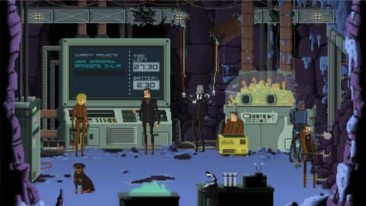80 Days – What We Think:
80 Days is a Steampunk-tinged reimagining of Jules Verne’s classic Around the World in 80 Days. Done in a highly interactive Choose Your Own Adventure text-based format using the slick interactive text platform developed by inkle, the game features lovingly-crafted narrative concerning the many people, places and things you encounter on your fabled race around the globe. Regardless the path you choose, truly, the reading element is a joy unto itself.
Unlike inkle’s previous adaptations of Steve Jackson’s Sorcery! books (which I reviewed here), there is no rewind button. Your choices are set, once made. This makes for an interesting change and one that obviously leads to more careful consideration before making choices. Also unlike Sorcery!, there is no combat, so you are effectively more engaged in a true storylike narrative that is unfolding rather than using the Jackson’s RPG-like character elements.
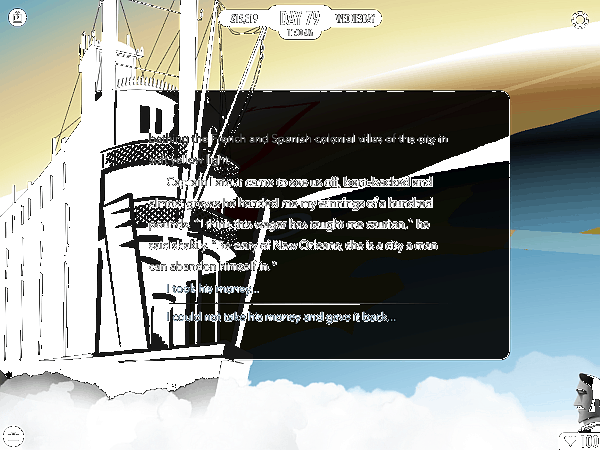
In spite of not having a combat or spellcasting system, 80 Days also has more RPG-like elements than I would have expected; not only does it track your inventory, and the prices of the things in your inventory based on where you are considering selling them, it also tracks your faction with Phileas Fogg, and a number of other factors. There is no way to see what these stats are, but presumably they are influencing something around you in some important way.
80 Days, Countless Ways
One way in which inkle creates a much greater sense of agency here, over those previous releases, is the number of different routes you can travel to get around the world; this reveals why Verne’s novel is such a strong choice for this outing.
For example, in my first attempt to circumnavigate the globe, attempting to negotiate a balance between intrigue and the time-lock, I visited only 27 cities out of a total 144. Achieving this took me the better part of three real-world days.
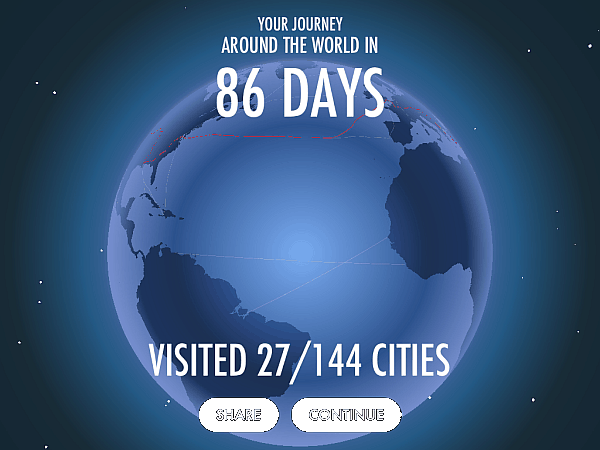
As your travel, you will discover new routes to various destinations, unlocked by way of exploration and interaction with the various colorful characters you meet along the way. Once you have chosen your next point of interest, you can engage an event, chat with a personality or just wait it out and progress along the route until you arrive, in which case the game becomes a screensaver, forcing you to observe the rather slow peregrination between destinations.
Perhaps this is to create a sense of immersion, and, events DO pop up along the way, but I found it unnecessarily tedious.
By events, I mean, you usually have one of several options – tend to your valet duties with your master – Phileas Fogg – speak to the captain, or other person of interest, about destinations in hopes of unlocking intel on new routes, and what commodities are of value or get some backstory on the locations history and current state of affairs.
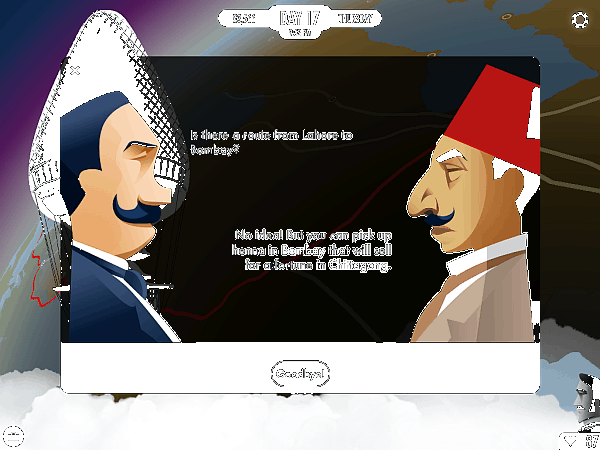
So Many Cities, So Little Time
When you arrive in any given city, you have various options, and they aren’t all the same between cities; you might be able to explore, do some banking or trade, or you can choose to stay at a hotel or plan your next route. All of these things require a certain amount of time, and herein we see the second reason this title is perfect for an inkle game: you have a built in timelock. So again, everything you may want to explore is working against the clock.
I can imagine this will drive completionists mad, but it also prevents the game from feeling limp and being exhausted by those who simply must uncover every nook and cranny. There remains always a level of intrigue and wonder at what might have been. This reinforces the positive decision, in my opinion, to not offer rewind nodes.
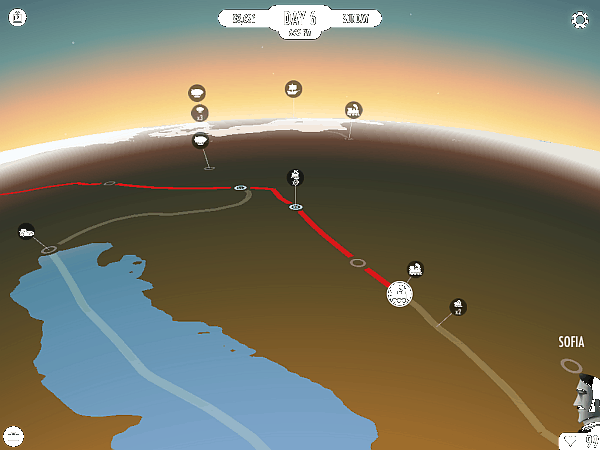
In The Hands Of Prose
The real star of the show here, is the writing: over a half million word script written by Meg Jayanth, rife with ornate and well-researched prose that offers a remarkably original adventure tale. Moreover, it affords a legitimate education in geography and culture.
In fact, the writing and research led me to recognize this as a literary tour-de-force insofar as game writing is concerned, and one of the most engaging tales of adventure I have encountered in a very long time, either as a work of interactive fiction or literature in its own right.
I did find the decision tree could sometimes get a bit laggy – presumably as the game was loading its next set of branches based on my latest decision – but this minor detraction pales against the literary splendor that awaits regardless of your chosen path.
Le Mise en Scene
The sound design is subtle, but immersive and nicely done. Playing with headphones I did notice some repetition in the walla tracks, but beyond that, the rustle of clothing, or rattle of chains, city ambiance and the chatter of crowds all help draw one in and remain committed to the journey. The diegetic music – be it the chanting in India, horns in the Ottoman Empire or string instruments in Asian cities – is a delight, and adds delicious flavor to the journey.
The illustrations, a combination of black and white silhouettes, colored avatars and an animated map of the globe, are imaginative and tastefully done. When an online connection is available, the game also displays the current location of other players in realtime, and tapping on any other currently active player reveals their distinct route – a fascinating touch that reinforces the concept that you are in a race.
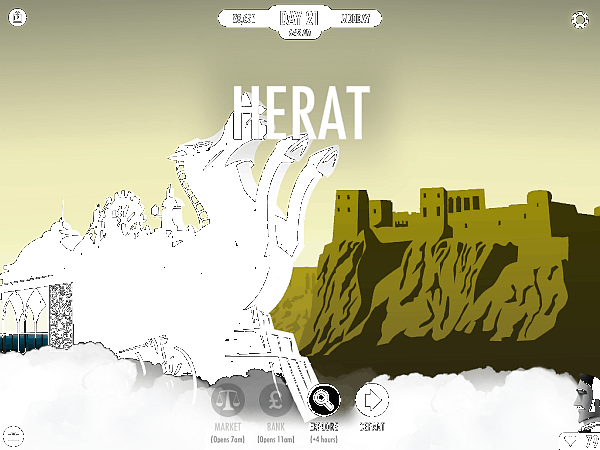
A Flight of Fancy
80 Days is a breathtaking accomplishment in engagement and one of the best releases I have had the pleasure of undertaking this year. From a design perspective, inkle Studios gets so many things right: agency, design, replayability, interactivity. Highly recommended.
80 Days at inkle – Official Site
Get 80 Days from the App Store
[xrr rating=”4.5/5″]


